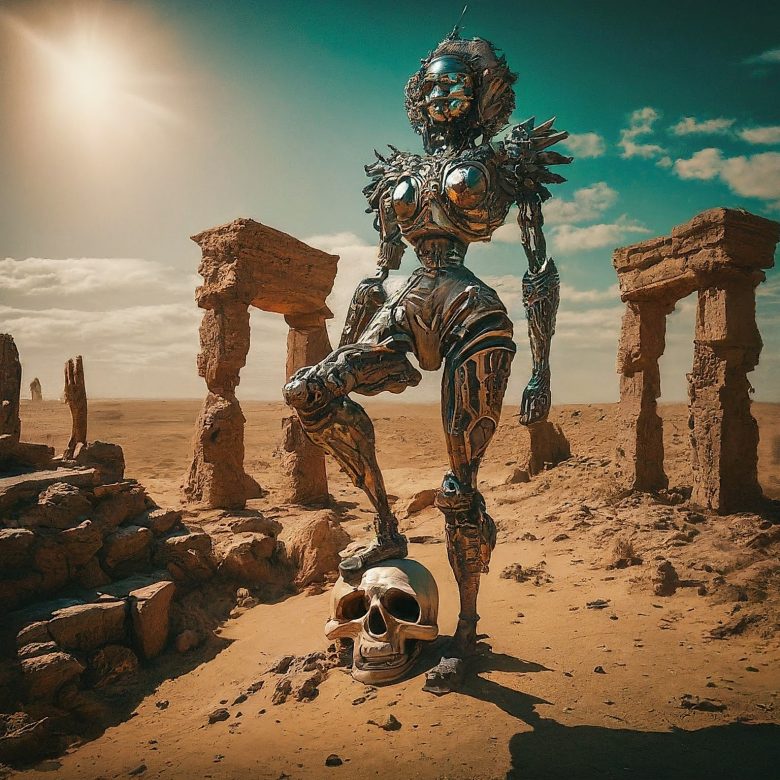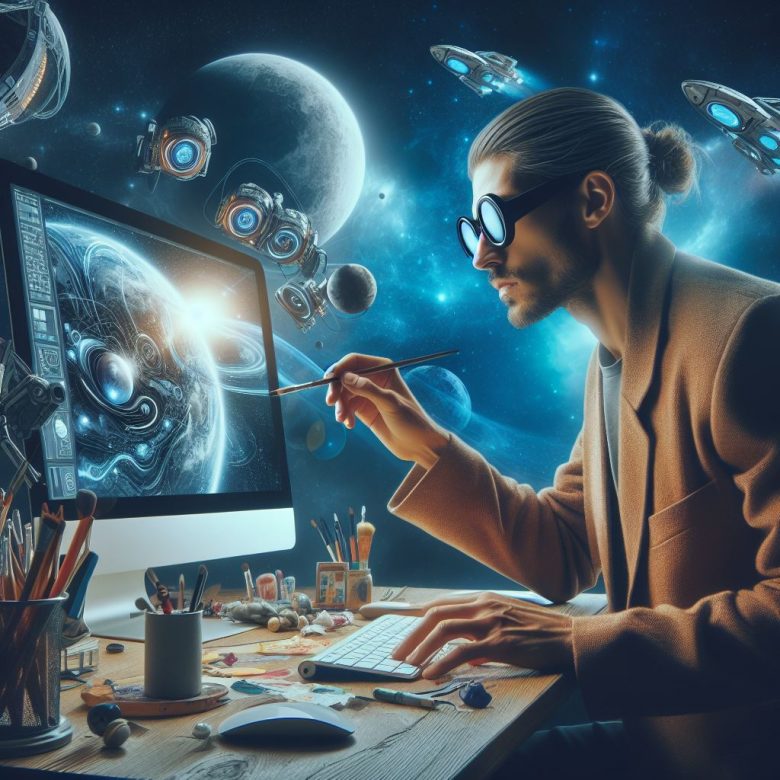Things are a bit crazy at the moment so the usual bi-monthly Dev Log will be a bit late.
In the meantime, I thought it might be time we talk about our stance on “AI” in general. In the 3D and related art industries, there has been a great deal of concern about the future of people’s careers and the ethics of current AI tools.
As a publisher, especially of CC0 content, we obviously have some thoughts about all this.
The obviously bad stuff

The rest of this post might be somewhat controversial to some, so let’s be clear about what we think makes AI sometimes bad.
Copyright law has yet to catch up with generative AI, so in many places, it’s a bit unclear what is and isn’t legally allowed. Hence we need to lean more on morals and ethics than the black and white law itself.
- We believe that if you do not expressly give permission in some way for others to use your work for “any purpose”, or in a database, or specifically for AI training, then it’s not OK to train an AI with it.
- Some freelancers are receiving less work because of AI, and that sucks.
- Some people have been laid off because their employer chose to replace them with an AI, and that sucks.
- Some people are earning less, because their work has been devalued by the accessibility of AI, and that sucks.
As time goes on, more and more artists will likely be affected like this and be forced to adapt or suffer.
We won’t make assets with AI

One thing that’s always been clear about publishing content on the internet is that there are volumes and volumes of trash, particularly when it comes to free content.
Long before AI-generated assets were a twinkle in anyone’s eyes, we made the decision to focus on quality over quantity. It’s why we spend weeks on every photoscanned texture instead of pumping out dozens of procedural textures like most other publishers.
With the introduction of AI-generated textures, HDRIs, and even 3D models, we predict a further increase of “trash” content on the internet, and we have no intention of joining this trend just to make some numbers go up.
However, in the long term, we believe these tools will improve and the quality of their outputs will meet or exceed the assets we make. Even still, we will not be using generative AI tools exclusively to create assets en masse.
That’s not to say we outlaw any kind of AI tool entirely – we already do use some “AI” tools to make some of our assets sometimes. For example, ArtEngine (RIP) has some handy tools to help make our photoscanned textures seamless. They often don’t work well, but when they do they save a lot of time that would have otherwise been spent painting and clone stamping manually.
The way we see it, as an artist you probably don’t actually care how the assets you need are made. Whether the fire extinguisher you want for your project is modeled in Blender and textured in Substance, photoscanned from real life, or generated with some AI, you don’t really care. As long as you can get a nice fire extinguisher, under a permissive license that suits your needs, you probably don’t care how exactly it was made.
But we do.
But not because we hate AI

We have nothing against generative AI, in fact, we think it’s pretty cool. We just recognize that these tools rely on a good foundation of data. The more “real” data (as opposed to “generated” data) they have access to, the better their generated results will be, meaning potentially the better your game or VFX shot will be.
Poly Haven has always been about lowering the barrier of entry for people to create higher quality 3D art by providing tools and content to everyone for free equally. In many ways, generative AI has similar potential to level the playing field.
Our choice not to make generated content is not based on some legal or moral stance, but out of a choice to be part of the source data used for training long term.
We want Poly Haven to stick to its core values, being a source of high-quality 3D content based on photographic data and real life, available to everyone as freely as possible.
But at what cost?

The reality of the progression of technology is that some jobs will be made less valuable as automation improves, even to the point of becoming obsolete.
Many people make the counterargument that your job won’t be replaced by AI, just that your job will be made easier and more efficient.
That’s true in some cases, but that also means employers and clients may want to pay less for your work, or let you go because they don’t need as many people for that role now.
This issue has been, and still is being, debated to death on the internet (and since the Industrial Revolution of course), so that’s not what I want to talk about here. Instead, I want to focus on what it means for Poly Haven.
Realistically, we’re working ourselves out of a job to some extent. We’re providing the ethically sourced no-strings-attached training data to tools that may ultimately replace us. Why go to some website to dig through hundreds of wood materials, when you can stay in your texturing software and ask it for exactly what you want?
Sure, there is some value in a library of any kind (regardless of how the content is created) that you can browse through when you don’t really know what you want yet, but this can be implemented alongside generative tools too.
The reality is, we think, that the future of small asset libraries like Poly Haven might not look too good. Whether it’s generative tools removing the need for 3rd party asset libraries entirely, or just massive one-stop shops like FAB promises to be, taking over any hope of competition, we feel it might be time to start adapting.
What we’re doing about it

First of all, Poly Haven the website is not going anywhere. It’s relatively cheap to host the website itself, so there’s no danger of all our assets vanishing because “AI took our jobs”.
It’s also not fundamentally changing. Poly Haven will still be a 3D asset library of CC0 content, and we’re still OK with people using our assets to train their AIs. We’re actually kind of proud that we can be one of the few platforms that allow this unconditionally and without questioning laws or ethics.
What we’re talking about is Poly Haven the team: The people who make the assets.
What’s the future for us?
We intend to use some of our excess resources to branch out a little and work on things that are related to asset creation, but not strictly just for those purposes. Something that we can use to help us make good assets, but with other goals and benefits as well.
In other words, we plan to make video games.
We’ve had this idea for some time, but originally more as a “dogfooding” idea than anything else. We wanted to make bigger content using our assets, not just static scenes and simple animations, to help guide us to make more usable assets.
The Blender Studio does something similar, making short films to help guide what features are developed for Blender and how they’re implemented. We could do the same, but for us, personally, short films are perhaps not as interesting as video games. We also think video games are maybe a little safer from being “replaced by AI” than films or other pre-rendered media since they have several more layers of complexity.
A modest game or two as a testing ground for our environment assets was the original idea. Now that we see the future of asset creation as a career in a bit of jeopardy, it seems this game development idea can serve another purpose as well: Diversifying our skills and income in the long term.
We obviously don’t think we can make an amazing AAA game right off the bat, but we also don’t have to. The future is not here yet, so we have some time to work on this idea slowly and make sure it aligns with what Poly Haven is today, while at the same time setting us up for what our team might need to transition to tomorrow.
We’re not “becoming a game studio”. We still make assets. We’re just trying to do that better, have some fun, and secure our future at the same time.
As always, I have to express our undying thanks to our Patrons who support us and enable us to do what we feel is right and good for everyone, instead of chasing profits like most other corporate publishers. We couldn’t do this without you <3
PS: Images in this post were generated with various AIs. Sorry 🙂 The satire was too tempting.

We stand with you!!
I love your approach.
I’ll never be going the EPIC way. With the direction of the world in general, monopoly scares the living daylight out of me.
I am so grateful there are still people like you out there. Thank you for your amazing work.
Nice!
As you said, I don’t really care how you created the assets. All I want is a nice and easy to use high quality library of realistic looking stuff. It’s up to you how you create it. I wouldn’t mind if you have a section for assets based on photos and one based on AI or maybe just tags for each case as long as it’s realistic looking high quality stuff nicely sorted and labeled 🙂
Thanks for the refreshing nuanced stance on AI, it is indeed very controversial and difficult to discuss at times, and I support your direction. I’m really curious which game engine(s) is/are being used or considered.
Amazing post, it is so refreshing to read an honest analysis of the effect of AI on the industry. Good, bad, or ugly, things are changing fast, and some people will thrive while others will suffer. It is important to try to predict what will happen in the future to develop different strategies and new pathways.
It never even occurred to me you guys might sell out to become spammy prompt monkeys. Suffice to say I agree with your decision. I’m on the PolyHaven Patreon because PolyHaven is a valuable community resource with actual human artists creating high-quality content that deserves our support. Besides, quality over quantity approach has still led to a sizeable quantity of content over time, AND it is consistently high quality.
AI generated textures could be used within a real art for sure, but if we want AI textures we might as well generate it ourselves, whereas real textures from real sources created by real artists like you guys do now has a value worth funding. If I want a prompt monkey, I can be my own d*mn prompt monkey rather than sifting through spammy floods AI generated content online.
I agree in part with the post, I don’t think AI can replace all services, but the human is paid to adapt the service and this it will never do
I’m a Poly Haven supporter on Pateron, and as an artist I *do* care how my assets are created. I believe that creating Art (with a capital A) is what separates humans from other animals and computers. For me, it’s not just about the output, but also about the process: which topics like labor exploitation and AI factor in to.
Arguably, an asset library that specializes in “realistic” models and materials is a good candidate for AI replacement. Do we need to model the same chair that everyone else has modeled? Perhaps only if we find joy in the process. For other purposes, why spend the time?
There may be a future where AI tools allow craftspeople to be better at their work, and I think some of that exists now, but I am also wary of a future where synthetic imagery cheapens the creative spark of humans.
Agree completely.
I agree with the policy decision, and I am someone who likes AI in coding and even 3D modeling. AI companies have not yet figured out how to master training off synthetic data, so photographic data base is the way to go.
“The more “real” data (as opposed to “generated” data) they have access to, the better their generated results will be. Our choice not to make generated content is not based on some legal or moral stance, but out of a choice to be part of the source data used for training long term.”
Obviously in 30 years, things can change, maybe they figure out how to master synthetic data training, or something else, but for the time being, the better the photo used in training, the better the output. An AI that is also trained off poly haven, and have more weights to poly haven (as oppose to the rubbish that is out there) could have very real potential.